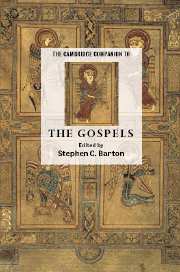Book contents
- Frontmatter
- Introduction
- Part I Approaching the gospels: context and method
- Part II The gospels as witnesses to Christ: content and interpretation
- 6 The Gospel according to Matthew
- 7 The Gospel according to Mark
- 8 The Gospel according to Luke
- 9 The Gospel according to John
- Part III The afterlife of the gospels: impact on church and society
9 - The Gospel according to John
from Part II - The gospels as witnesses to Christ: content and interpretation
Published online by Cambridge University Press: 28 January 2007
- Frontmatter
- Introduction
- Part I Approaching the gospels: context and method
- Part II The gospels as witnesses to Christ: content and interpretation
- 6 The Gospel according to Matthew
- 7 The Gospel according to Mark
- 8 The Gospel according to Luke
- 9 The Gospel according to John
- Part III The afterlife of the gospels: impact on church and society
Summary
As the fourth of the 'fourfold gospel' of the New Testament canon, the Gospel of John relates a selection of the words and deeds of its central figure, Jesus of Nazareth, so as to present his identity and significance. And while many of those deeds, such as the healing of the sick, teaching disciples and confronting the religious and political authorities of his day, are familiar to readers of the other gospels, the terms, images and titles through which John characterizes Jesus are often unique to John. In this gospel, Jesus is the incarnation of God's own Word, the embodiment of God's glory, truth and will, and the way to life with God. Although the other gospels speak of the manifestation of God's kingdom and the presence of God in Jesus, it is the fourth gospel which boldly declares that the one who became flesh was with God 'in the beginning' and indeed 'was God' (1.1). As one who came from God, not just as a prophet or authorized teacher, but as the embodiment in human history of God's Word and the revelation of God's glory, truth and life, Jesus makes God known to humankind, not by conveying information about God, but rather through the personal, incarnate revelation of God. That is the daring and foundational claim of the fourth gospel and the key to Jesus' identity in it.
- Type
- Chapter
- Information
- The Cambridge Companion to the Gospels , pp. 182 - 200Publisher: Cambridge University PressPrint publication year: 2006
- 1
- Cited by

